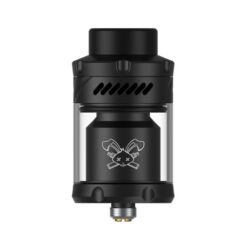Underage vaping is a serious concern in many countries. So much so that distributors can be shut down and lose their distribution licenses if they are found to be selling vape devices and products to underage children. In the UK, anything over 2 ml of nicotine requires a prescription of some sort and in the US, each State has its own laws to combat underage vaping. Locally, we still have some work to do when it comes to preventing underage vaping, however, efforts are being made, and we seem to be moving in the right direction.
Underage vaping poses significant mental and physical risks to the user. Underage vapers risk, addiction, inflammatory lung diseases linked to a compromised respiratory system as well as psychological effects from underdeveloped neural pathways due to addiction.
-
 Spook (NEW) – Goofy GrapeR300.00
Spook (NEW) – Goofy GrapeR300.00 -
 Straight Up – Cola *3R220.00
Straight Up – Cola *3R220.00 -
 Amplified – Peanut Butter CustardR240.00
Amplified – Peanut Butter CustardR240.00
How Does Nicotine Affect Growth And Health In Underage Users?
Nicotine is a very addictive substance, albeit harmless compared to many other substances that one could be addicted to. Nicotine affects how the brain and body develops, especially when used at a young age. The human brain keeps developing until the age of 25, consuming nicotine before the brain has fully developed can negatively affect the part of the brain that is responsible for attention, learning, mood and impulse control. This would create a generation of adults with short attention spans, who can’t control their emotions and how they react with the outside world.
Cons Of Being Addicted To Nicotine At A Young Age
There are many cons to being addicted to nicotine, especially from a young age. These range from stunted physical and psychological growth to respiratory illnesses that will manifest in adulthood. Being addicted to nicotine at a young age can affect your:
- Physical growth
- Mental/psychological health
- Overall health
Physical Growth
Recent studies have shown that consuming nicotine during the adolescent years can affect bone growth. A study, published in the Journal Annals of Epidemiology, found that teenage boys who don’t smoke were on average 2.54 cm taller than their smoking counterparts.
Psychological Health
The adolescent brain only stops developing at the age of 25 years old. Being addicted to nicotine during your adolescent years will stunt the development of certain areas in the brain, namely the prefrontal cortex. An underdeveloped or stunted prefrontal cortex results in improper impulse control, as well as an increased risk of neuropathic pain and poor neuroplasticity.
Overall Health
Vaping nicotine, especially at a young age, can increase the risk of developing respiratory or heart diseases in adulthood. The use of nicotine is linked to lifestyle diseases such as high blood pressure, increased heart rate, chronic lung infections as well as an increased risk of cardiomyopathy which can lead to heart attacks.
What Is Being Done To Prevent Underage Vaping?
The Vapour Products Association of South Africa (VPASA) started a Youth Access Prevention campaign aimed to ensure that retailers adhere to strict guidelines when it comes to selling vaping products. VPASA put together guidelines for physical stores, clearly stating the signs and symbols that need to be visible to all customers, such:
- Signs that state that no sales will be made to people under the age of 18
- Posters stating that a customer may be requested to produce their ID
- Websites must also have age gateways before customers can make a purchase
In addition to all of this, online retailers and courier companies will partner together to ensure that the vaping products are not received by anyone under the age of 18. Retail stores who sign the VPASA code of guidelines and are found to be in violation of the guidelines will be subjected to a disciplinary procedure which can lead to expulsion.
-
Sale Product on sale
 Hellvape Dead Rabbit 3 RTA
Hellvape Dead Rabbit 3 RTAR585.00Original price was: R585.00.R410.00Current price is: R410.00.
Tips For Parents Who Think Their Teen Is Vaping
If you suspect that your teen is vaping, you should try to do everything you can to stop them from continuing. These are some tips that you can use to prevent your teen either stops or never even starts to vape:
- Have an open dialogue
- Think more than just vaping
- Ensure your teen is prepared for peer pressure
- Set a good example
- Establish a smoke-free environment
- Do the maths
- Help them understand the dangers
- Have An Open Dialogue
Talk to your teen about smoking and vaping. Have an honest and open conversation with them and create a space where they feel comfortable to talk freely and give their point of view.
- Think More Than Just Vaping
Vaping is not the only thing that your teen can get into. Explain that all forms of underage smoking/vaping are dangerous, from nicotine free e-liquids to hookah and cigarettes.
- Ensure Your Teen Is Prepared For Peer Pressure
Make sure that your teen knows that they don’t have to do what their friends are doing. A friendship based on an unhealthy mutual activity is definitely one they can do without.
- Set A Good Example
If you vape, try to quit, or at the very least try not to vape around your teenage kid. Kids typically do what they see their parents doing, especially at that age.
- Establish A Vape-Free Environment
Ensure that the areas where teenage children spend the most time are vape-free zones. Don’t let friends and family vape anywhere in your home or around your children.
- Do The Maths
Vaping is not a cheap habit, try to deter your teen from vaping by comparing the cost of vaping to a new phone, clothing, or other interests your teenage child might have.
- Help Them Understand The Dangers
Getting a teenager to understand is probably the most difficult thing to do, but it is worth trying. Talk to your teen about the long-term effects of picking up a nicotine addiction at a young age – it will be much harder to quit later on in life.
If you think your child is vaping, try and understand why and how they started. This will go a long way in figuring out how to approach the conversation and, more importantly, how to get them to truly stop.






